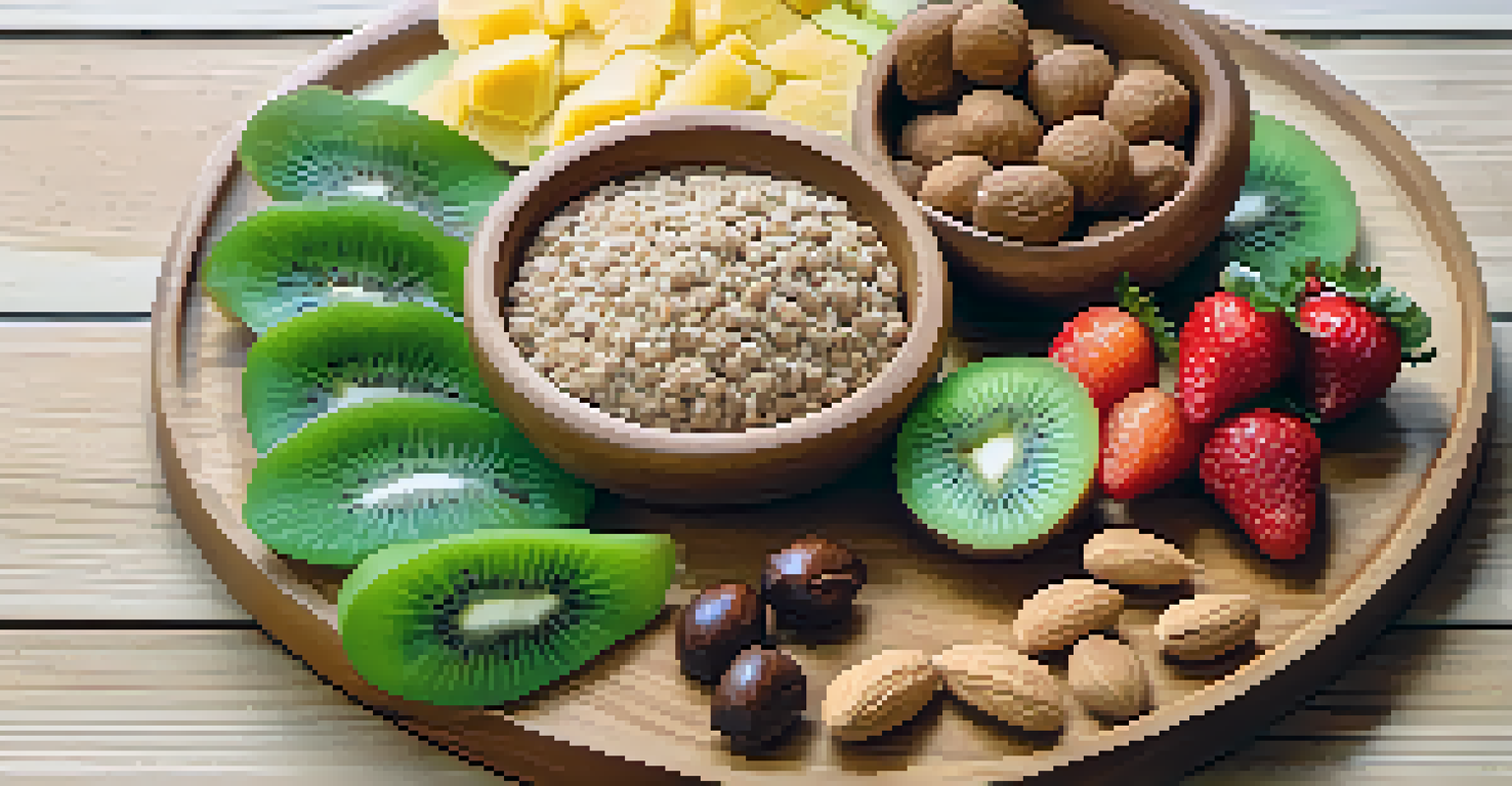Raw Vegan Diets are Best for Everyone: A Myth to Challenge

Understanding the Raw Vegan Diet Concept
A raw vegan diet is all about consuming uncooked plant-based foods. This means fruits, vegetables, nuts, and seeds are the main staples, while all animal products and cooked foods are off-limits. Advocates claim that this diet boosts energy and promotes better health, but is it really suitable for everyone?
Let food be thy medicine and medicine be thy food.
The appeal of raw veganism often stems from its emphasis on whole, unprocessed foods. People are drawn to the idea of eating clean and enjoying the benefits of a diet rich in vitamins and minerals. However, it’s important to recognize that everyone's body is different, and what works for one person may not work for another.
While many enjoy the vibrant flavors of raw foods, the restrictive nature of this diet can lead to nutritional deficiencies. For instance, certain nutrients like vitamin B12, iron, and omega-3 fatty acids are harder to obtain from a strict raw vegan diet, raising questions about its long-term viability.
The Nutritional Shortcomings of Raw Vegan Diets
One of the biggest challenges with a raw vegan diet is ensuring adequate nutrient intake. For example, while fruits and vegetables are high in vitamins, they often lack sufficient protein and healthy fats. This can leave some individuals feeling fatigued or unwell if they don’t supplement carefully.

Moreover, cooking food can enhance the bioavailability of certain nutrients. For instance, cooking tomatoes increases the levels of lycopene, a powerful antioxidant. Therefore, by avoiding cooked foods entirely, raw vegans might miss out on these nutritional benefits.
Nutritional Challenges of Raw Veganism
A raw vegan diet can lead to nutritional deficiencies, particularly in protein and essential fatty acids.
Additionally, some people may struggle with digesting raw foods. For instance, those with sensitive stomachs may find raw cruciferous vegetables hard to digest, leading to discomfort. This highlights the importance of personalizing dietary choices to fit individual health needs.
Individual Health Needs Vary Significantly
When it comes to diets, one size does not fit all. Different individuals have unique health conditions, lifestyle factors, and metabolic needs that influence their dietary choices. For example, athletes often require higher protein intake, which can be challenging to achieve on a raw vegan diet.
You are what you eat, so don't be fast, cheap, easy, or fake.
Some people may also have pre-existing conditions that require specific dietary adjustments. For instance, those with certain autoimmune diseases might need to include cooked foods for better nutrient absorption and overall health management. This shows that flexibility in dietary choices is often necessary.
Moreover, age and stage of life can play a significant role in nutritional needs. For example, children, pregnant women, and the elderly have different requirements that may not be met adequately with a solely raw vegan diet. It's crucial to consider these factors before jumping on any diet trend.
Psychological Impact of Restrictive Diets
Following a raw vegan diet can also have psychological implications. The strict nature of such a diet may lead to feelings of guilt or anxiety around food, especially if individuals find it challenging to adhere to the guidelines. This can create a fraught relationship with eating and food choices.
Social situations can become tricky as well; dining out or attending gatherings can be daunting for someone on a restrictive diet. This can lead to feelings of isolation or frustration, as they may feel limited in their options compared to their peers. The psychological burden of such restrictions should not be overlooked.
Individual Needs Vary Significantly
Dietary requirements differ greatly among individuals, highlighting the need for flexibility in food choices.
Moreover, the pressure to maintain a certain lifestyle can lead to burnout. Many people may start with good intentions but find themselves overwhelmed by the commitment to a raw vegan lifestyle. It's essential to approach dietary changes with balance and moderation in mind.
Cultural and Personal Preferences Matter
Food is deeply rooted in culture and personal preference. For many, traditional cooked meals represent comfort and familiarity, and switching to a raw vegan diet may feel alienating. Embracing a diet that resonates with one's cultural background can be vital for overall well-being.
Additionally, personal taste plays a significant role in dietary choices. Some individuals simply prefer the flavors and textures of cooked foods over raw options. Forcing oneself to adhere strictly to a raw vegan diet can lead to dissatisfaction and may ultimately result in abandoning the diet altogether.
It's crucial to respect that each person's palate and cultural heritage influences their food choices. Therefore, promoting a diet that embraces a variety of cooking methods and ingredients might be more beneficial than advocating for a one-size-fits-all approach.
The Importance of Balanced Diets
Instead of adhering strictly to a raw vegan diet, a balanced approach that includes a variety of foods may be more beneficial. Incorporating both raw and cooked foods can provide a wide range of nutrients while minimizing the risk of deficiencies. This balance allows individuals to enjoy the best of both worlds.
Foods such as whole grains, legumes, and lean proteins can complement a plant-based lifestyle, offering essential nutrients that may be lacking in a raw diet. By diversifying one’s diet, individuals can enjoy a broader spectrum of flavors and improve overall health.
Balance Over Restriction
Incorporating both raw and cooked foods fosters a more balanced diet, enhancing overall health and satisfaction.
Ultimately, the goal should be to foster a healthy relationship with food that prioritizes nourishment and enjoyment. Experimenting with different foods and cooking methods can lead to a more satisfying and sustainable dietary pattern.
Listening to Your Body is Key
One of the most important aspects of any diet is listening to your body. It’s essential to pay attention to how different foods make you feel and adjust your diet accordingly. If a raw vegan diet leaves you feeling drained or unwell, it might be time to rethink your choices.
Practicing mindfulness around food can enhance your connection to what you eat. This means recognizing cravings, understanding hunger cues, and being aware of how certain foods impact your mood and energy levels. Taking the time to reflect on these elements can lead to better dietary decisions.

Ultimately, health is personal, and what works for one person may not work for another. By tuning into your body and being open to change, you can create a diet that nurtures both your physical and mental well-being.